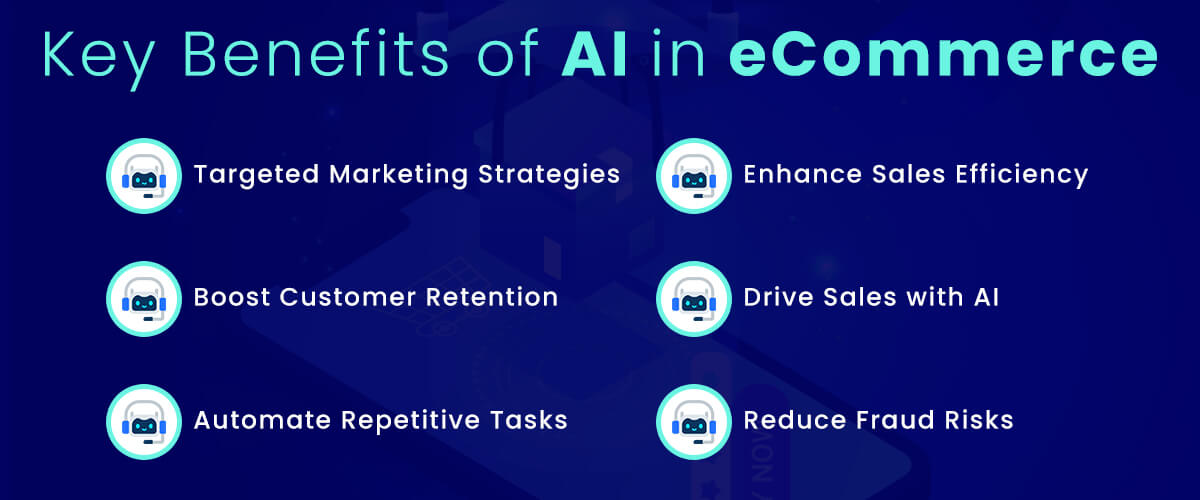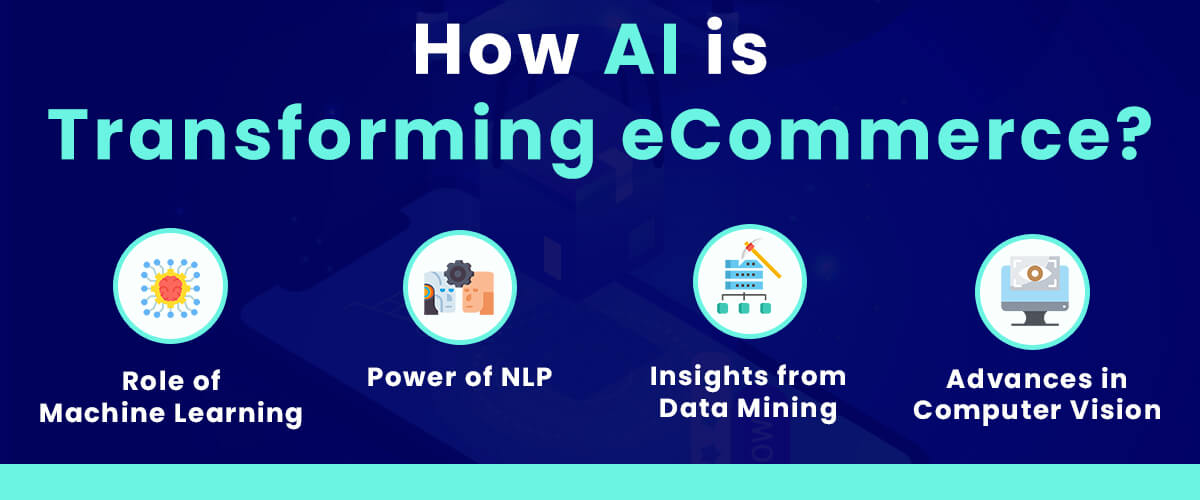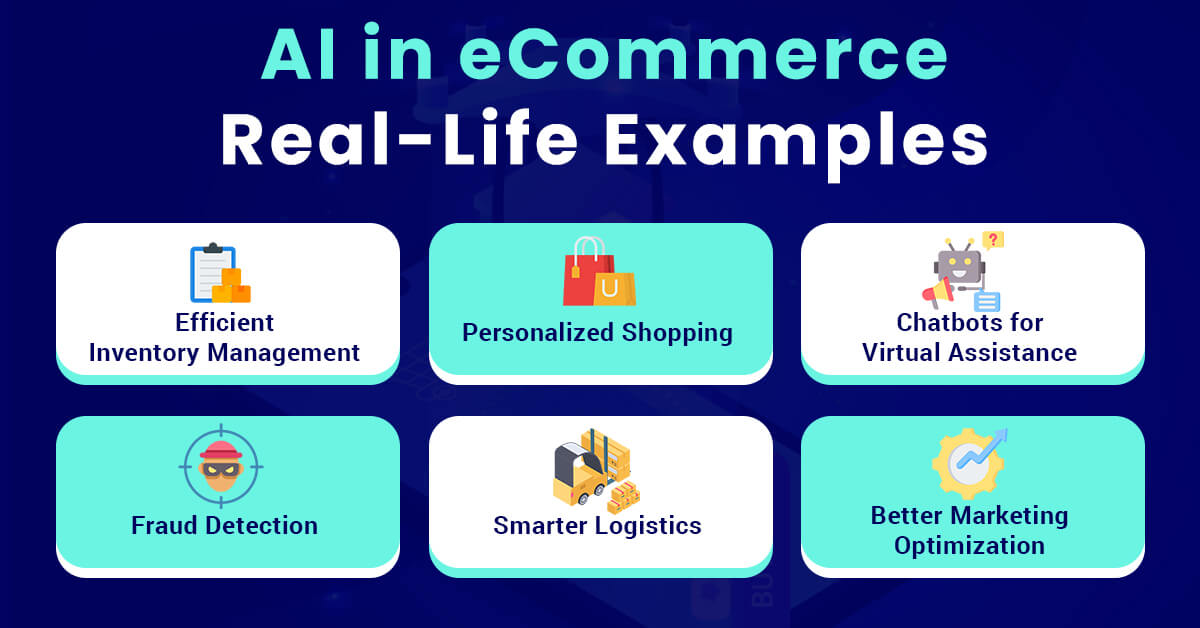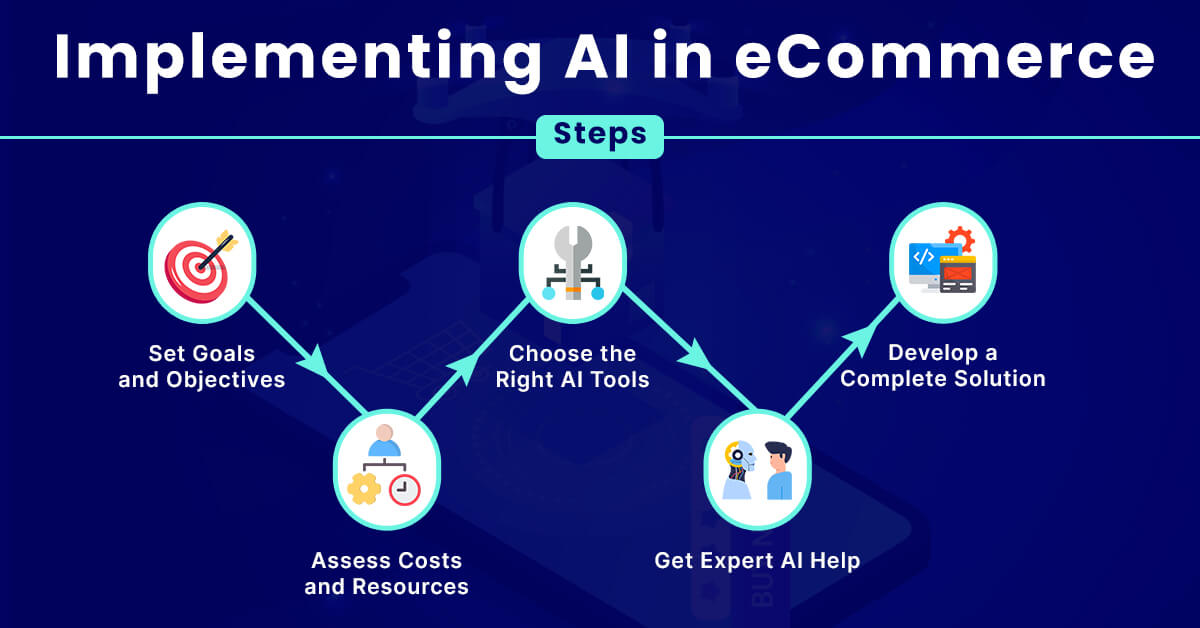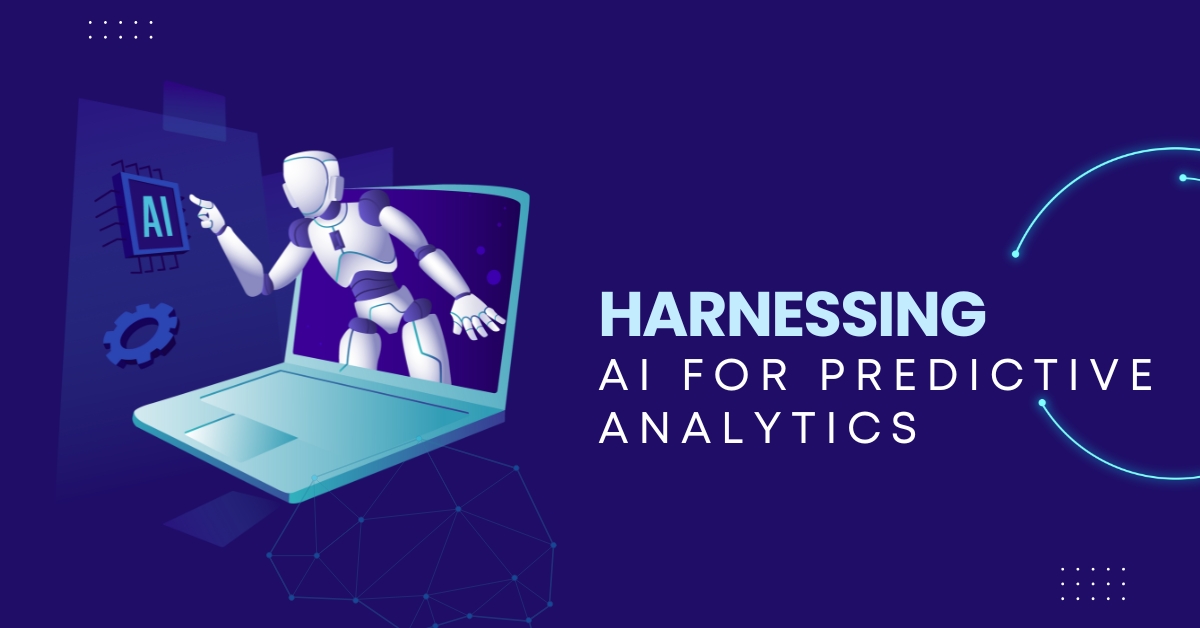
The global impact of AI in Ecommerce is transformative, potentially growing AI in the eCommerce market size from $8.06 billion in 2024 to $14.07 billion by 2028 at a CAGR of 14.9%. Personalized shopping experiences, enhanced search, virtual assistants, and government support contribute to the growth. The AI’s imprint will deepen in the eCommerce industry with an improved focus on customer data analytics, supply chain management, intelligent product recommendations, and conversational commerce.
eBay, Alibaba, Amazon, and Walmart successfully demonstrated real-world AI use cases in the e-commerce landscape that bring performance, financial, and other gains. Artificial Intelligence in eCommerce business is a journey with customer-centricity at the heart of innovation. Soon, it’s expected to become an indispensable partner in the Ecommerce industry.
This blog will discuss the AI technology subsets driving the eCommerce market, the advantages of using AI in eCommerce, the real-world AI applications revolutionizing eCommerce industry, and the process of implementing AI strategy in eCommerce stores. With the help of this blog, you can learn how to fuel your e-commerce business and grow using AI technology.
Table of Contents
Top Benefits of Using AI in eCommerce
AI in eCommerce is evident in how technology moves from sci-fi movies into potential use cases, driving enormous benefits to online merchants.
Targeted marketing to attract potential prospects
The significance of relevance holds a ton in eCommerce marketing, where customers expect to see the relevant marketing message. The e-commerce business delivers relevant information at the right time, and the chances of making the customers view the message and purchase the products/services are higher.
With the capability to hyper-segment customers based on demographics, search patterns, age, and behavior, AI enables sending a set of advertisements to a group of intended customers. It increases the likelihood of ad clicks, reducing the acquisition cost. Furthermore, AI-powered push notifications are a popular retargeting tool that consistently reminds users about the latest offer, new arrivals, or others based on user searches and browsing patterns analysis.
High customer retention with remarketing
Existing customers are when reminded of the products they are looking to buy or already bought in the past, which improves the chances of making them visit the store and complete the purchase. Moreover, using AI in product remarketing enables reaching out to customers in a hyper-targeted way, which delights the customers and retains them.
The use of Artificial Intelligence in remarketing campaigns ensures that your eCommerce business stays at the forefront of customers’ priorities when buying products online. Personalized campaigns increase retention rates and revenue significantly.
Task automation to eliminate repetitive work
Online E-commerce stores are becoming popular because it is available 24/7 across all channels. AI-enabled automation allows businesses to promptly answer customers’ queries contextually while saving time and energy. The time saved is spent solving complex customer queries, which results in improved conversion rates and high profit margins.
Also, AI helps with sales synchronization by instantly featuring a new product launch on all channels and automatically providing discount messages to privileged customers, product recommendations, and low-level support.
Improved sales process efficacy
To drive users to the bottom of the sales funnel, more than enticing them with attractive discounts is needed. For example, continuous follow-upon individual customers’ activities, such as abandoning the cart or frequently browsing the same product, increases the chances of turning visitors into potential customers. Engaging the customers with simple questions and answers from bots regarding the sales process ensures no distraction and makes them complete the purchase.
Increase sales with AI power
The role of AI in sales is impressive, from sales communication transformation to uncovering hidden opportunities. It’s a game-changing technology for increasing sales with sentiment analysis, lead scoring, and AI recommendations.
The personalized shopping experience with tailored recommendations, virtual voice assistants, chatbot support, and custom discounts enables users to make purchases. Additionally, targeted marketing and advertising help approach the right users with the right message at the right time, which increases sales at scale.
Minimize fraudulent activities
Growing cyber crimes inhibit some users from online purchases and providing their financial details. With AI security measures, users’ activities and transactions are continuously monitored to suspect risks and stop fraudsters immediately to prevent the harm they cause to the online store. User behavior analysis with AI to build customer profiles helps identify deviations from regular patterns, which is efficient in finding account takeover cases.
AI capability of advanced pattern recognition and data relationships enables fraud detection that’s impossible for humans to discern. Moreover, AI learns from new data that helps adapt to enhancing fraud detection and solution tactics so that AI always stays one step ahead of fraudsters.
AI Bringing a Paradigm Shift in the eCommerce Industry – How?
AI technology has reimagined the eCommerce industry with potential use cases that were difficult to imagine before. Its applications are implemented to make different areas of eCommerce stores intelligent.
- Machine learning, popularly called ML technology, allows computers to learn from data using statistical techniques and make accurate predictions. Deep learning and large language models are further subsets of ML used for better data understanding. The self-learning ML and DL algorithms make precise forecasting for inventory management with sales trends analysis. Better data understanding ensures improved customer interactions and unmatched experience delivery.
- Natural language processing, or NLP technology, allows computers to intelligently interpret human written text and generate insights from the collected data. NLP is used by eCommerce stores to enhance chatbots with more capabilities that let them contextually answer the users for product inquiries. Intelligent chatbots quickly respond to user queries 24/7 making the store’s customer support active round-the-clock.
- Data mining: The mines of historical and current data are collected to make AI systems learn and provide predictions. eCommerce stores are generating petabytes of data that’s continuously growing and AI helps them gather and analyze various types of information to provide actionable insights. AI-powered product recommendations based on past sales history and current browsing behavior are the best instances of the same.
- Computer vision: This technology allows computers to scan images and videos and interpret information in seconds. Ecommerce stores leverage computer vision to improve product search with image search features. It’s very popular among modern customers to capture a picture of the product and then use computer vision-powered image recognition feature to find the product easily.
Six Real-Life Use Cases of AI in eCommerce
Looking at the future of artificial intelligence, AI plays a significant role by making different aspects of online E-Commerce shop function intelligently. There are six primary use cases where E-Commerce stores apply AI technology the most.
Inventory management
Low inventory levels influence user experience, and excessive inventory improves storage costs and waste. AI-enabled inventory management ensures optimal inventory levels are maintained with historical and current sales data analysis.
RFID tags attached to every product track product movement from the warehouse to the distribution center and then to the customers. It showcases which products are selling fast and in which geographical region. The collected data automates inventory replenishment and restocks inventory on time with supplier integration. It ensures inventory always has the required products.
For example, Alibaba’s AI-driven Instant help feature, whose next phase involves streamlining buyer-supplier communication to obtain information regarding product purchases shortly, allows businesses to make informed purchases.
Personalized shopping experience
Personalized shopping experience starts with intelligent search and getting tailored recommendations for product purchase and ends at expected shipping time and payment preferences. AI intelligent search uses faceted search, navigation, recent search, and autocomplete techniques, enabling users to find what they are looking for easily. AI collects and processes users’ purchase history, browsing behavior, and ordering patterns for personalized product recommendations.
Amazon brilliantly implemented AI-based product recommendations that understand users’ shopping patterns and suggest complementary products under captions such as “Customers also viewed” or “People also purchased.”
Taking a step ahead, eBay enabled an AI-powered “Find it on eBay” feature that facilitates search with photo uploads for faster product discovery. ShopBot offers personalized shopping suggestions that engage users and make them purchase more with the best experience.
Virtual assistance with chatbots
Chatbots work actively 24/7 and handle user queries virtually like the best customer representatives in multiple languages and time zones. With ML, NLP, computer vision, and DL models, AI connects the dots and provides insightful information to customers, surpassing human speed and accuracy levels in different areas. It also helps live support agents resolve disputes without much ado.
AI makes voluminous request handling, order processing, and transaction handling easier by bridging the gap between physical and online stores. In addition to 24/7 customer service, virtual assistants over voice also help users during online checkout. An AI-enabled checkout page instantly answers all the users’ questions regarding product details and shipping information without requiring them to return to the previous page.
Fraud prevention
With new malware sample detection, the losses created by global E-Commerce fraud have increased to $48 billion. This terrifying figure in payment fraud in a cloud environment is unhealthy for E-Commerce growth.
Using AI in cloud computing enhances security by adding an extra layer of protection. It is powerful in monitoring and detecting anomalies in transactions that are impossible to spot through traditional ways. For example, multiple transactions in a short time, high-value transfers, or transactions from unfamiliar locations are flagged instantly.
ML models continuously generate and compare user profiles based on users’ historical and present browsing patterns, transaction history, and device history to predict and prevent fraud. As cybercrimes advance, AI algorithms continuously learn to combat new ways of fraudulent activities.
Smart logistics
Logistics management is a vital part of the e-commerce business because delays in product delivery ruin the customer experience and take them to the competition. Over 95% of consumers expect shipping issues to be resolved in transit, otherwise impacting delivery experience.
In this area, artificial intelligence companies help eCommerce businesses shine with AI-enabled intelligent logistics. It proactively projects delivery time, transit times, delays in shipment, and demand spikes or dips, which helps troubleshoot problems quickly and easily.
Marketing efforts optimization
Customer data processing and insights are the backbone of E-Commerce marketing efforts. AI helps with customer segmentation based on various options, driving valuable data that enables customizing marketing efforts accordingly.
For example, AI in email marketing enables personalizing emails with every customer’s name and customized content according to their purchase habits and history. Such user-optimized content improves email opening rates, makes users interested in products, and allows them to initiate the required action.
Five Steps to Implement Artificial Intelligence in eCommerce
The innovative use cases and incredible benefits of AI in the eCommerce sector excite eCommerce businesses to incorporate AI strategy. Moving ahead and following a roadmap helps online eCommerce stores harness the maximum potential of AI technology.
Define your goals and objectives
Determining business goals and objectives to accomplish with Artificial Intelligence technology is essential before investing in AI software. Businesses must list the problems they expect to solve using AI. Comparison helps identify whether AI is a practical solution and provides everything that helps businesses achieve customer, sales, and ROI success.
Identify the costs, time, and resources required
AI implementation in e-commerce businesses incurs substantial time and money that must be planned earlier. Implementing a new system is followed by training the staff, which is time-consuming and expensive. Checking regulatory concerns that may pop up for rolling out AI in some countries must be addressed. For example, GDPR must be considered for data collection through AI, and it must be updated on the website privacy policy page so that no dispute occurs at a later stage.
Selecting the proper AI application
Clarifying business goals and time-money-resources estimation provides a straightforward equation for implementing an AI strategy. When eCommerce opts for an AI system, suitable AI use cases must be selected, focusing on business efficiency and customer experience. It helps prioritize AI tools that add value to eCommerce processes and operations and deliver the best customer experience.
Leverage AI expert assistance
Readymade AI tools that are easy to integrate even require the assistance of AI professionals for implementation. The team will help build or integrate the AI system with a clear strategy. However, ensure your AI development partner is reliable and trustworthy and helps your eCommerce business innovate and add value to the eCommerce processes.
Build full-fledged solution
When priorly launched MVP success convinces you, it’s time to build a full-fledged AI solution for your E-Commerce business. After rolling out AI tools to enhance e-commerce processes, monitoring workflows and iterating AI implementation are necessary to identify whether they bring the expected results. This continuous process ensures winning outcomes for e-commerce businesses forever.
AI in eCommerce- The Road Ahead
Artificial intelligence is growing steadily, with potential use cases in every industry vertical. However, the current AI applications in the eCommerce industry look shiny, but gradual evolution and maturity will help eCommerce witness exceptional advantages. From improved customer experience and high conversion rate to business operations optimization and other benefits set the online eCommerce business up for success. Further, it helps eCommerce business owners to fit product and marketing strategy well in the customer’s shoes. It’s time to uncover hidden opportunities, eliminate mistakes, and boost growth boundlessly with artificial intelligence. Let’s plan to implement AI in your eCommerce business.
AI in eCommerce FAQ
How is AI changing the eCommerce industry?
Extracting valuable data and gaining rich insights to make informed decisions has become a prerequisite of eCommerce businesses that are best fulfilled by AI technology. AI-driven insights are transforming the eCommerce industry with personalized user experience, data-backed decisions, and optimization of eCommerce operations.
How is AI being used in eCommerce marketing?
AI is used in the eCommerce industry to understand customers’ buying and browsing patterns, which enables targeted marketing campaigns and remarketing. It helps acquire and retain potential users in eCommerce with an omnichannel strategy.
 Derek Cohen
| Apr 23, 2024
Derek Cohen
| Apr 23, 2024
Analyzing business activities and data to formulate the best business development ideas is where I earn appreciations and remunerations. I’m an ardent reader, business adviser, gadget aficionado and an amateur yet an avid writer. My urge for innovative writing evokes every time I come across new gadgets, neo technology and novel technical events.
